Answer these simple questions and we will find you the BEST prices
Which type of solar quotes do you need?
It only takes 30 seconds
100% free with no obligation

Get Free quotes from loft conversion specialists near you

Save money by comparing quotes and choosing the most competitive offer

The service is 100% free and with no obligation
- GreenMatch
- Loft Conversion
- Loft Conversion Types
- 2-Bedroom Loft Conversion
- 2-Bedroom Loft Conversion Price
2-Bedroom Loft Conversion Price Guide for the UK 2025

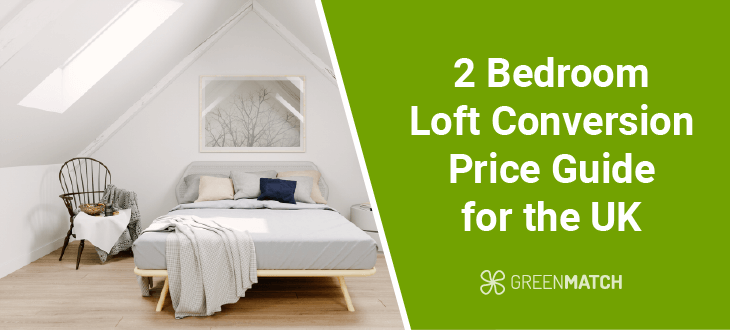
- Converting a loft into a 2-bedroom space in the UK typically costs £40,000–£50,000, covering structural work, insulation, windows, stairs, and finishes. Costs may vary based on project complexity, location, and materials.
- Unexpected costs, such as for fixing the building, renting scaffolding, or VAT, can arise. It's wise to budget an extra 10–15% for these contingencies.
- Converting your loft not only adds space but also improves your home’s efficiency, saving on heating costs and boosting its value.
In this guide, we will show the costs of turning your loft into a 2-bedroom area. We'll cover what might change the cost and talk about building regulations to make sure you can follow them easily without spending too much.
We aim to give you advice that's easy to understand and implement. After reading, you'll know how to make choices that perfectly fit your budget.
Ready to start your 2-bedroom loft conversion? Don’t waste hours searching for specialists! Simply, fill out a 30-second form to get up to three free, no-obligation quotes from local professionals — no fees or commitments needed. Click the button to begin!
- Describe your needs
- Get free quotes
- Choose the best offer
It only takes 30 seconds



How much does a 2 bedroom loft conversion cost?
Turning your loft into 2 bedrooms costs about £45,000 per 30 m2 in the UK. The price can change based on how big the loft is, how complex your design is, and the type of materials you choose. Additional costs may include professional fees, building control charges, and VAT.
The most affordable option is a Velux conversion (£30,000–£40,000 per 30 m2). It's cheaper because this type of loft conversion doesn't require big changes to your roof's structure.
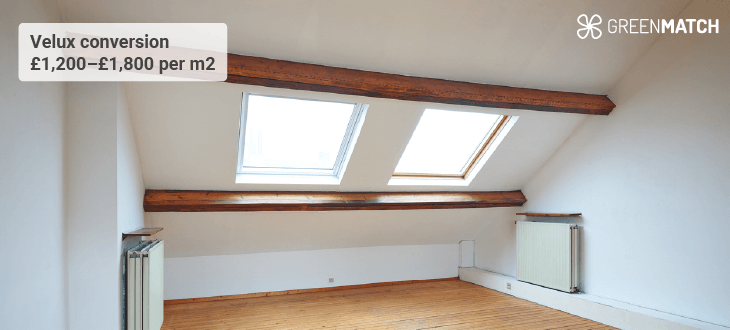
More complex designs like hip to gable loft conversion cost much more, between £45,000 and £55,000. This is because it involves more labour for changing the shape of your roof and requires using more materials such as bricks and insulation. All this extra work and materials mean a higher cost.
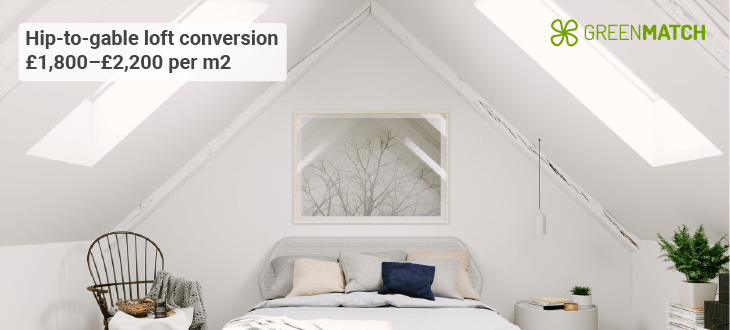
It usually takes 8 to 12 weeks to finish this kind of project. This includes planning, designing, getting permission if needed, and the building work. Sometimes, factors like bad weather, changes to your plan, or waiting for materials can cause delays which can increase the costs.
Cost per type of conversion
When you think about converting your loft into a 2 bedroom space, there are four main types to consider: Velux, dormer, hip-to-gable, and mansard. Each has a different cost, depending on how much space you want to add and what changes you need to make.
Here's a simple breakdown of the cost per square metre for each type:
| Type of conversion | Cost per m2 | Cost per 30 m2 (Example) |
|---|---|---|
| Velux | £1,200–£1,800 | £36,000–£54,000 |
| Dormer | £1,500–£2,000 | £45,000–£60,000 |
| Hip-to-gable | £1,800–£2,200 | £54,000–£66,000 |
| Mansard | £1,900–£2,500 | £57,000–£75,000 |
What you need to know about different loft conversion types:
- Velux conversions are the least expensive and easiest to do. They're great for bringing in more light without altering the shape of your roof. However, you need to make sure your attic is big enough for two bedrooms.
- Dormer conversions add more room and height to your loft. They have a window that sticks out from the roof, making the loft feel bigger. Dormer loft conversion cost varies based on the dormer's design, with shed dormers being simpler and gable dormers being more complex.
- Hip-to-gable conversions change the slope of your roof to make more space. They turn the sloping side of your roof into a straight wall, but they require more work on the roof structure.
- Mansard conversions create a lot of new space by making the roof slope nearly vertical. They offer the most room but are the most expensive.
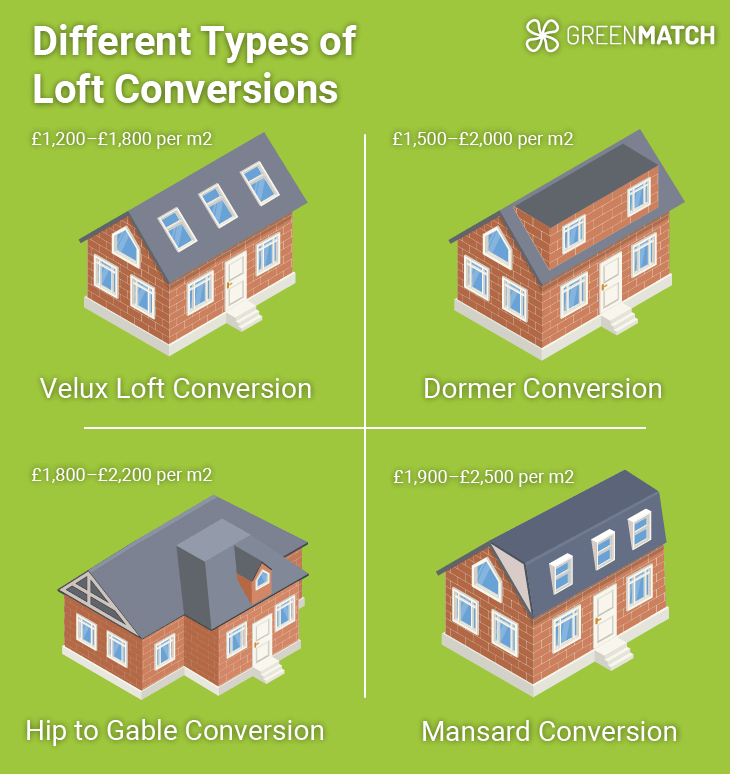
Supply costs
To help you understand the supply costs for a 2 bedroom loft conversion, let’s take a look at a specific example — medium hip-to-gable 2-bedroom conversion with a bathroom. Here is the general overview of costs you can expect for this conversion:
- Insulation: Good insulation is key to keeping your loft warm, saving costs on heating and helping the environment. It is important to stop sound from travelling between the two bedrooms. Expect to pay between £25 and £40 per square metre. For a loft that's 30 square metres, this means around £750 to £1,200 in total.
- Windows: For light and air, two high-quality Velux windows might cost you £500 to £2,000 from low to high end each.
- Roofing materials: Matching tiles or slates for your roof and the new gable end will be about £2,000 to £3,000, depending on what you choose and the size of your roof.
- Staircase: A timber staircase to the loft varies in price from £700 to £2,000, based on its design and the wood used.
- Doors: Plan £100 to £300 for each door, including two for bedrooms and one for the bathroom, which totals around £600.
- Electrical supplies: For wiring, lights, sockets, and safety devices, costs can range from £800 to £1,500, depending on how much electrical work your loft needs.
- Plumbing supplies: For pipes, radiators, and bathroom fittings, expect spending from £2,000 to £4,000. This price can change based on the quality of the fixtures you choose.
- Finishing supplies: Materials like drywall, paint, and others for finishing your loft might cost £1,000 to £1,500 for a medium-sized space.
Labour costs
When planning a loft conversion, labour costs are a significant part of your budget. These expenses vary depending on the professionals you need, which might include plumbers, tilers, contractors, builders, architects, and engineers.
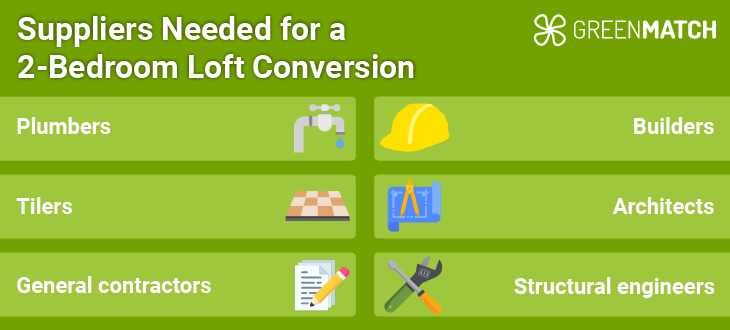
Here's a simple guide to what you might expect to pay these experts for their time:
| Professional | Average hourly rate (£) | Average weekly rate (£) |
|---|---|---|
| Plumber | £40–£60 | £1,600–£2,400 |
| Tiler | £20–£30 | £800–£1,200 |
| General contractor | £25–£35 | £1,000–£1,400 |
| Builder | £25–£35 | £1,000–£1,400 |
| Architect | £50–£75 | Based on the project scope |
| Structural engineer | £50–£70 | Based on the project scope |
These rates are for guidance only and can vary based on location, the complexity of the work, and the professional’s experience. A loft conversion project typically takes between 8 to 12 weeks, depending on the scope and scale of the conversion.
Investing in the right team for your loft conversion is not just about meeting current needs — it's about adding lasting value to your home. By understanding and budgeting for these labour costs, you're taking a crucial step toward a smart, valuable upgrade to your property. Click below to get free quotes tailored to your needs.
- Describe your needs
- Get free quotes
- Choose the best offer
It only takes 30 seconds



Unexpected and other costs
A loft conversion is an exciting project that can add significant value to your home. However, along with the planned expenses, not-so-obvious costs can often arise. Knowing these potential extra costs can help you manage your budget more effectively.
Unexpected and overlooked costs to include in your budget:
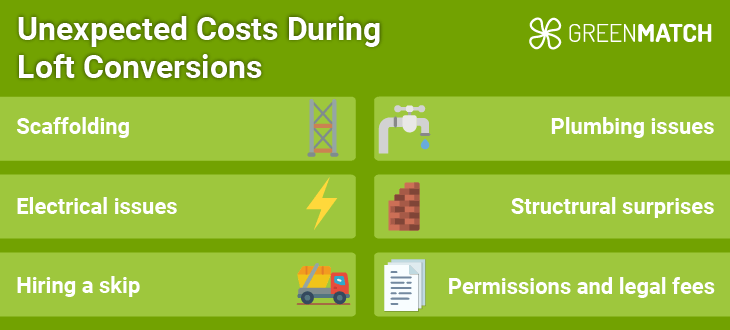
- Hiring a skip: Removing waste is a part of any construction project. You might need to hire a skip to dispose of the debris, which can cost from £200 to £400 per week, depending on the size needed.
- Scaffolding: For safety and ease of access, scaffolding may be required. This can add £800 to £2,000 to your project costs, based on the size and duration of hire.
- Electrical issues: Upgrading your electrical system to support the new space can reveal unforeseen issues, potentially adding £500 to £2,000 to your budget.
- Plumbing challenges: Low water pressure and plumbing reroutes can increase costs. Moving water tanks or installing a new boiler could add £1,000 to £5,000, depending on complexity.
Some other problems that can come up:
- Structural surprises: Once work begins, hidden issues with your home's structure may come to light, requiring additional support work. For example, during a loft conversion, it's not uncommon to discover that the existing roof trusses are not strong enough to support the new living space. This might require the installation of steel beams to ensure the structure's safety and integrity.
- Regulation compliance: Meeting current building regulations might necessitate additional work, especially for insulation, fire safety, and stair access. This potentially increases costs.
- Weather delays: Bad weather can slow down work, especially if your conversion involves significant external work. Delays can increase labour and rental costs for equipment and facilities necessary for the loft conversion. These can include scaffolding, skips for waste removal, and potentially other construction equipment the rental of which is time-sensitive.
It's wise to set aside a contingency fund to mitigate these risks. Typically, it’s 10–15% of the total project budget. This fund can cover unforeseen expenses without derailing your project.
Bathroom costs
According to Abbott Holliday Consulting, if you want to include a bathroom, with water supply, waste plumbing, ventilation, and fit-out, this type of loft conversion could cost between £35,000 and £50,000.
When planning for a bathroom in your loft conversion, several key elements contribute to the overall cost:
Plumbing: Extending water and waste pipes to service the new bathroom is essential. This work can cost between £2,000 and £4,000, depending on the complexity of the installation and the distance from existing plumbing.
Fixtures and fittings: The choice of fixtures (toilet, sink, shower/bath) significantly affects your budget. A basic set can start from £500, but opting for high-end or designer fixtures can increase this cost substantially.
Tiling and waterproofing: The cost for it can range from £500 to £1,000, depending on the quality of the tiles and the size of the bathroom.
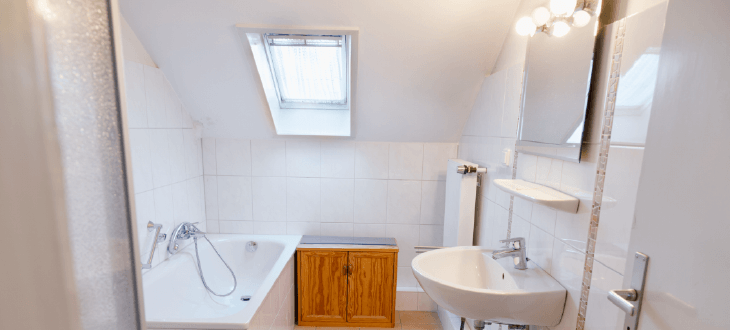
Ventilation: Proper ventilation is crucial in a bathroom to prevent mould and moisture damage. Installing an extractor fan can cost between £150 and £300.
Lighting and electrical work: Adding safe, waterproof lighting and electrical outlets will generally cost between £500 and £1,000.
Labour: The cost of labour for installing a bathroom varies, but you can expect it to be a significant portion of your budget, potentially adding an additional 20-30% to the costs mentioned above.
It's a good idea to get several quotes from contractors to ensure you're getting a fair price. Talking to architects and structural engineers can help, too. They'll verify your plans and the work being done meets all the building rules, especially for the plumbing and electrical parts.
- Describe your needs
- Get free quotes
- Choose the best offer
It only takes 30 seconds



Factors affecting the cost of a 2 bedroom loft conversion
Certain aspects hold significant sway over your budget beyond the basics of materials, labour, and design preferences. Let's delve into some critical factors that are often overlooked.
Compliance with building regulations
Bringing an existing space to current building standards can be a major cost factor. For example, upgrading insulation to meet the latest UK building regulations can add approximately £1,500 to £3,000 to your project.
Compliance is crucial for safety and legality, affecting areas like fire safety (which might require installing a sprinkler system costing upwards of £2,500) and structural integrity (potentially adding £5,000 to £10,000 for reinforced beams in older properties).
Location
The geographical location of your property can greatly influence conversion costs. For instance, labour and material costs in London are typically 20-30% higher than the UK average.
In a London loft conversion, where average costs might range from £50,000 to £60,000, the same project could cost £35,000 to £45,000 in the North of England, reflecting the difference in local living costs and pricing.
Complexity of the project
Complex projects, such as those requiring significant structural changes or the addition of a bathroom, can see costs rise sharply. Adding a bathroom alone, with plumbing, fixtures, and finishes, can increase project costs by £10,000 to £15,000.
A conversion requiring extensive roof alterations, like a Mansard style, might start at £57,000 in less expensive regions but can easily exceed £60,000 in higher-cost areas.
Tailoring solutions to your home
Custom solutions for unique homes can also add to costs. For example, a bespoke staircase designed to fit a specific space may cost between £2,500 and £5,000, significantly more than a standard installation.
Similarly, custom windows or skylights designed to match an existing roof slope can increase costs by 15-25% over standard models.
Long-term benefits
Despite the higher upfront costs, a loft conversion offers considerable long-term returns. A report from the Nationwide Building Society suggests that adding a bedroom and a bathroom through a loft conversion can increase a home's value by up to 21%. The percentage is likely to go up for 2 bedrooms and a bathroom.
For a property valued at £250,000, this could mean an increase of around £50,000 in property value, far outweighing the initial investment. Moreover, energy-efficient upgrades can yield savings of up to £200 per year on heating bills, contributing to the project's value over time.
How to reduce the price of your 2 bedroom loft conversion
Cutting the cost of your loft conversion without compromising quality is possible with careful planning and smart choices. By implementing the strategies below, you can achieve cost savings while maintaining the quality of the final result.
- DIY what you can: Tackling parts of the conversion yourself, like painting or simple finishes, can save you a significant amount. For example, professional painting might cost between £200 and £500 per room, but doing it yourself only costs the price of paint and supplies.
- Choose cost-effective finishes: Opting for less expensive materials for finishes can greatly reduce costs. Laminate flooring instead of hardwood, or a quality but less costly brand of fixtures and fittings, can trim thousands off your final bill.
- Recycle or upcycle: Using reclaimed materials for parts of your conversion, such as wood for flooring or vintage doors, can add character while saving money. Reclaimed materials can be up to 50% cheaper than new ones.
- Simplify your design: Complex designs require more labour and materials. Choosing a straightforward, simpler design can significantly lower costs without affecting the functionality of your new space.
- Plan efficiently: Effective planning can reduce waste and avoid costly mistakes. Detailed drawings and specifications can help you buy only what you need and prevent expensive changes mid-project.
Obtaining multiple quotes for your loft conversion is a critical step for getting the best value for your money. Here's why:
- Cost comparison: Multiple quotes allow you to compare prices and services, ensuring you're not overpaying.
- Scope clarity: It helps clarify what’s included in the project, avoiding hidden costs down the line.
- Negotiation power: Armed with several quotes, you have a stronger position to negotiate better terms.
- Describe your needs
- Get free quotes
- Choose the best offer
It only takes 30 seconds



FAQ
Yes, you can convert a loft into two bedrooms, provided the space meets the necessary size and height requirements. Planning and design are crucial to ensure both bedrooms meet living standards for space, lighting, and ventilation.
The cost for a two-bedroom loft conversion typically ranges from £40,000 to £50,000. This price can vary based on factors like location, the complexity of the design, and the finishes you choose.
The average cost of a loft conversion in the UK is approximately £40,000. However, this figure can fluctuate between £36,000 for a simple 30 m2 Velux conversion to over £60,000 for a more complex mansard conversion with high-end finishes. These costs include structural work, insulation, windows, a staircase, and basic finishes.
The most expensive part of a loft conversion is typically the structural alteration and reinforcement needed to make the space livable. This includes the costs associated with modifying the roof, such as raising it or adding dormers, which can significantly impact the overall price.
For example, installing a mansard or hip-to-gable conversion requires extensive changes to the roof structure, leading to costs exceeding £15,000 to £20,000. Adding a bathroom also significantly increases the price due to the need for plumbing, fixtures, and waterproofing.

Tania is an experienced writer who is passionate about addressing environmental issues through her work. Her writing aims to shed light on critical environmental challenges and advocate for sustainable solutions.
We strive to connect our customers with the right product and supplier. Would you like to be part of GreenMatch?

